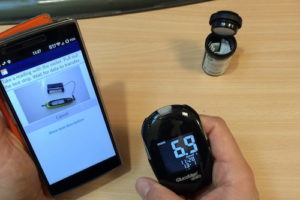 A 21-month study into the safety and effectiveness of a smartphone application for women with gestational diabetes, developed with support from NIHR Oxford Biomedical Research Centre, has shown positive results.
A 21-month study into the safety and effectiveness of a smartphone application for women with gestational diabetes, developed with support from NIHR Oxford Biomedical Research Centre, has shown positive results.
The randomised controlled trial (RCT) of the GDm-Health app, a digital therapeutic product powered by smart algorithms for the treatment of gestational diabetes, involved 203 patients.
It showed significantly higher patient satisfaction with care, significantly better adherence to blood glucose monitoring, a significant reduction in caesarean sections, and a reduction in pre-term births.
The mean health care costs of the GDm-Health group was more than £1,000 less than the control group.
The app was developed as part of a collaboration between Oxford University Hospitals NHS Foundation Trust, the University of Oxford and Drayson Health.
The RCT was made possible by funding and scientific input from the NIHR Oxford BRC, whose Technology and Digital Health Theme is led by Professor Lionel Tarassenko, Head of Engineering Science, University of Oxford.
He commented: “This trial is another example of how self-management by patients using digital health tools can be secure, gives them greater control of their condition and reduces the number of times they have to visit clinic. It improves communication between patient and clinical staff, reduces the amount of time spent by nurses and midwives on administrative tasks and allows for accurate auditing of data about care and outcomes.”
Gestational diabetes mellitus (GDM), defined as new onset or recognition of glucose intolerance in pregnancy which resolves following birth, is increasing in prevalence around the world, driven by demographic and lifestyle changes. In the UK, the rise is predicted to reach over 16%, from a figure of around 4% in 2008.
The current recommended way of preventing adverse maternal and foetal outcome is to closely monitor blood glucose levels. The most common method of managing diabetes in pregnancy is finger-prick blood glucose testing, with women recording their blood glucose results in paper diaries around six times a day. These are then reviewed regularly by doctors and midwives in clinic. It is a time-consuming process, open to the risk of transcription errors.
GDm-Health is a direct patient-to-clinician blood glucose monitoring management system that allows clinicians to review patient-annotated blood glucose results in real time. It is based on a smartphone app that enables women to connect a blood glucose meter to their smartphone using Bluetooth or NFC (near field communication) and then automatically collect blood glucose measurements.
These measurements, along with any text-based commentary the woman wishes to record, are transmitted directly to the clinical team where they may be reviewed via a web-based software application.
As a result, clinicians get more time to focus on the woman’s care needs rather than collecting and recording data and have the ability to prioritise care to women most at need.
Dr Lucy Mackillop, Consultant Obstetric Physician at OUH and Honorary Senior Clinical Lecturer and the University’s Nuffield Department of Obstetrics and Gynaecology, is the clinical lead for the development of GDm-Health and led the RCT.
She said: “GDm-Health was developed in partnership with patients, clinicians and engineers. This trial was conducted in real world conditions within the NHS and demonstrates the potential utility of GDm-Health to improve care and outcomes for women with gestational diabetes and their babies.”
Lord Drayson, Chairman and CEO of Drayson Health, commented: “We are delighted with these clinical trial results, which underline the GDm-Health product’s safety and efficacy in improving outcomes in gestational diabetes and the progress we are making in our strategic research collaboration with Oxford University and Oxford University Hospitals NHS Foundation Trust.
“Our focus now shifts to making GDm-Health widely available across the UK and internationally, helping to improve maternal and neo-natal outcomes despite the rising prevalence of diabetes in pregnancy.”
Among the successful outcomes of the RCT were:
- Significantly higher patient satisfaction with care [(Median 43, IQR 39-46) in the GDm-Health group versus (median 44.5, IQR 41-46) in the control group, (Kruskal-Wallis c2(1)=3.9, P=.049)]
- Significantly better adherence to blood glucose monitoring [mean 3.80 readings per day, (SD 1.80) in the GDm-Health group and mean 2.63 readings per day, (SD 1.71) in the control group P<.001]
- Significant Reduction in caesarean sections [(27/101, 26.7%) in GDm-Health group versus (47/102, 46.1%) in the control group, P=.005]
- Reduction in pre-term births [(5/101, 5.0%) in GDm-Health group versus (13/102, 12.7%; OR 0.36, 95% CI 0.12-1.01) in the control group]
The RCT concluded: “Further studies are required to explore whether digital health solutions can promote desired self-management lifestyle behaviours and dietetic adherence, and influence maternal and neonatal outcomes. Digital blood glucose monitoring may provide a scalable, practical method to address the growing burden of GDM around the world.”
The results were presented, and made available open access, in JMIR Mhealth and Uhealth following a 21-month study (NCT01916694).
GDm-Health is listed on NHS Digital’s Apps Library.